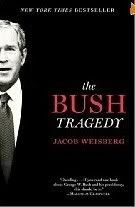 Jacob Weisberg has written a lot of good stuff, most of which I haven't even realized until now. He helped Robert Rubin write the autobiographical In an Uncertain World (which I also reviewed), he did a book of Bushisms, and he does columns for Newsweek all the time.
Jacob Weisberg has written a lot of good stuff, most of which I haven't even realized until now. He helped Robert Rubin write the autobiographical In an Uncertain World (which I also reviewed), he did a book of Bushisms, and he does columns for Newsweek all the time.In The Bush Tragedy, Weisberg illustrates not just what went wrong, but how. And to make the psychology even more compelling, he relates the Bush dynasty to Shakespeare's Henry V saga.
In the first chapter he examines the Bush and Walker family traditions that helped shaped George W.'s personality. Weisberg also details the formative influences on his life, from the death of his younger sister when he was seven to his father's presidential campaign.
The second chapter takes a skeptical look at Bush's religious beliefs, which -- for a self-proclaimed born-again Christian -- are surprisingly shallow. From the third chapter Weisberg looks at the personalities that influenced Bush 43's administration. Karl Rove and Dick Cheney get the most attention, for it was their political views that dominated policy decisions.
Finally, the author compares Bush against his own role models (such as Reagan, Churchill and Truman), concluding that when Bush looks at history, he sees only that which affirms his already established position.
Reading the Bush Tragedy helped me understand how the Bush administration got so jacked up. You had Bush Jr.'s compulsion to distinguish himself from his father, who was nuanced, meticulous, and deliberate. As a result, Bush allowed subordinates to pursue their own goals under the guise of boldness, empowerment, and (disastrously) persistence.
He concerned himself little with the long term effects of their agendas, eventually leading to Democratic stonewalls in Congress and lingering conflicts in the Middle East. Karl Rove's dream of a long-term Republican coalition disintegrated in 2006, and Cheney's efforts toward an unfettered executive branch (wire tapping, Guantanamo Bay) have destroyed U.S. credibility on human rights overseas.
Bush believes that he'll be vindicated in the end, but like in Shakespeare's tragedies, he'll probably never know where he went wrong.

No comments:
Post a Comment